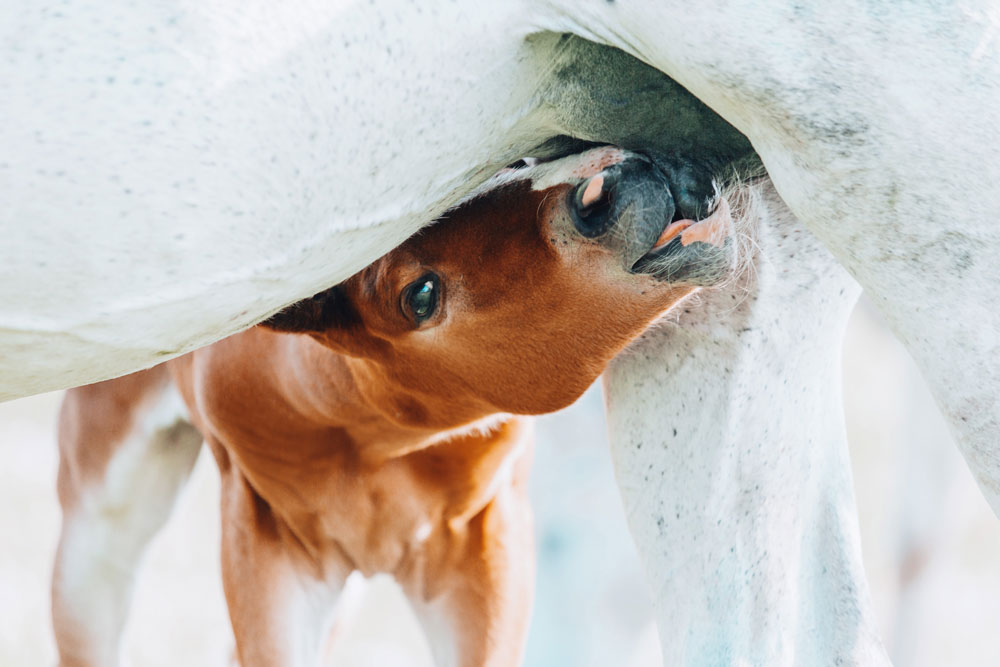The microbiota is critical to equine digestive health, which in turn significantly affects the performance horse’s overall wellness. For a long time, the evidence of digestive health’s impact on attitude and performance has been largely anecdotal. However, emerging research has now established a direct link between problematic behavior in horses and the specific microbes in their hindgut (Mach et al., 2020).
Knowing how your horse’s microbiota health and its performance are linked can help you make the right decisions about overall care and training. Even owners who are not training a performance horse should be aware of the ways in which their horse’s gi tract health can improve its comfort, longevity, and ability to be ridden for pleasure riding purposes.
Rebalancing your horse’s gut with diet and supplements could positively impact wellness, behavior and performance.
What We Currently Know About the Microbiota in Horses
Horses have a diverse microbiota inside their gut made up of bacteria, fungi, protozoa, archaea, and even viruses. This mix of microorganisms in the gut must be balanced for your horse to be healthy and perform brilliantly.
While these gut microbes live throughout the horse’s entire GI tract, they’re largely concentrated in the hindgut. The microbiota’s main function is extracting nutritional hydrocarbons called volatile fatty acids (VFAs) from forage, a process known as fermentation. The hindgut receives digested grasses (and other fibrous feeds like hay or beet pulp) after they’ve been broken down into chyme by various enzymes and acids in the stomach and small intestines. The cecum, which together with the colon makes up most of the hindgut, holds about 30 liters of chyme. The colon holds another 80 liters. The combined total of microbes in these two parts of a horse’s digestive tract can be as high as one billion microbes per gram. By making VFAs available through hindgut fermentation, these microbes are essential to ensuring your horse gets a sufficient dietary energy source.
Recent research is beginning to tease out the exact contribution of the microbiota to a horse’s athletic ability. A study of 185 performance horses conducted by French researchers found that behaviors like biting, kicking and other common stereotypies are associated with specific microbes found in the horse’s microbiota. According to the study, the microbiota contributes more to performance than genetics. (Mach et al., 2020.)
Alterations to the microbiota in horses can lead to a change in the fermentation patterns in the GI tract, which can imbalance the gut and lead to a host of health concerns that all stem from this fermentation problem. Veterinarians will tell you that many common equine health concerns can all be traced back to gi tract health issues.
As improved technology has allowed for more advanced study, it has become clear that hindgut microbiota issues are directly linked to many of the more serious equine health concerns that are common to performance horses. This does not mean that leisure horses or horses that have been retired from riding are less at risk, however. A horse of any age can fall prey to hindgut issues that can lead to a decrease in its overall vitality (De La Torre, 2020).
Stress and its Link to Gut Health
Stress can come to bear on performance horses who are already dealing with diminished gi tract health. Multiple stressors including physical exertion, trailering, and inadequate recovery negatively affect the integrity of the gut lining and alter microbiota balance and metabolism.
Also, stress causes the hypothalamus-pituitary-adrenal (HPA) gland to be activated, releasing glucocorticoids. This can impact the immune system and increase gut permeability, which may allow bacteria and toxins to move through the gut lining and into the bloodstream.
When the microbiota is affected by this stress and HPA relationship, there can be lasting damage to the gut and an inability for horses to properly digest food or extract nutrients from it. As well as reduced health, horses with stress-induced gut conditions will show reduced performance and possibly also display behavioral issues.
Biting, cinchy behavior, bucking, and being “behind the leg” can be linked to the health of the gut. Studies have not shown any direct link to the breed of the horse when these behaviors are present and instead show a correlation with the make-up of the microbiota (Andrews, 2020).
While you can only do so much to reduce the impact of training and travel on your equine partner, you can make sure that you support their gi tract health so that they will feel their best. Horses that feel good and have the energy to perform their job are always going to experience less stress during training than horses who are not given the necessary support for their needs (Tavener et al., 2020).
What Can You Do to Support a Healthy Microbiota?
If your performance hasn’t displayed the physical health, behavior, or performance you desire, you should always consider that the root cause could be gi tract health. Challenges caused by travel, regular training sessions, heat and cold, as well as age can all conspire together to affect your horse’s microbiota health which, in turn, is directly linked to its gi tract health.
You can help your horse to stay healthy and feel great with the right digestive health management strategy. While good management, quality forage and feed, and clean water can create a good baseline for your horse’s gi tract health, you will still likely need to provide additional digestive support in the face of stalling, traveling, training, and competing.

This is where SUCCEED can help. SUCCEED supports a healthy, balanced microbiota as well as good structure and function throughout the entire GI tract. It’s a simple, daily strategy to encourage a stable microbiota.
SUCCEED can be the difference between a healthy equine partner and a horse that struggles and underperforms. Managing gi tract health with SUCCEED is a trusted way to make sure that your equine partner can be at its very best.
References:
De La Torre, U., Henderson, J.D., Furtado, K.L., Pedroja, M., Elenamarie, O., Mora, A., et al., 2019. Utilizing the fecal microbiota to understand foal gut transitions from birth to weaning. PLoS ONE 14(4): e0216211. https://doi.org/10.1371/journal.pone.021621
Andrews, F., 2020. Colonic Ulcers: A Pain in the Hindgut! Equine Health Studies Program LSU. Edu https://www.lsu.edu/vetmed/ehsp/horse_health/lsu_tips/colonic_ulcers.php
Mach, N., Ruet, A., Clark, A. et al., 2020. Priming for welfare: gut microbiota is associated with equitation conditions and behavior in horse athletes. Sci Rep 10, 8311, https://doi.org/10.1038/s41598-020-65444-9
Tavenner, M.K., McDonnell, S.M., Biddle, A.S., 2020. Development of the Equine Hindgut Microbiome in Semi-Feral and Domestic Conventionally-Managed Foals. Animal Microbiome 2(43). https://www.vet.upenn.edu/docs/default-source/research/equine-behavior-laboratory/tavenner_et_al-2020-animal_microbiome.pdf?sfvrsn=6388f0ba_0




